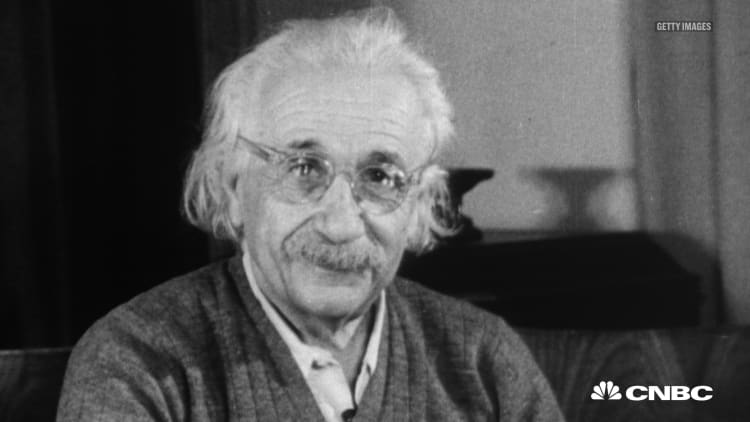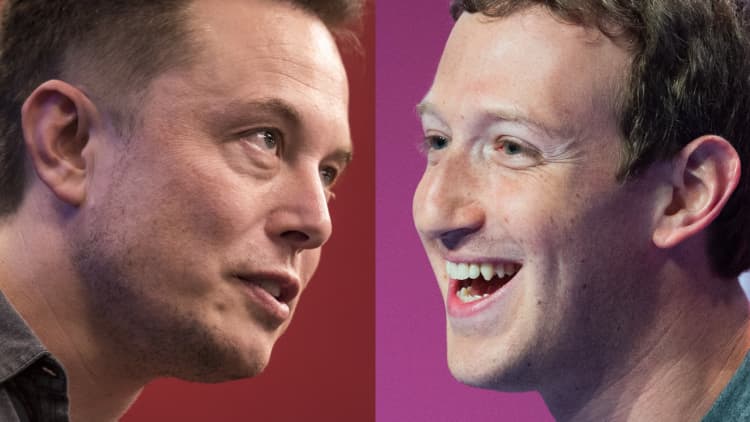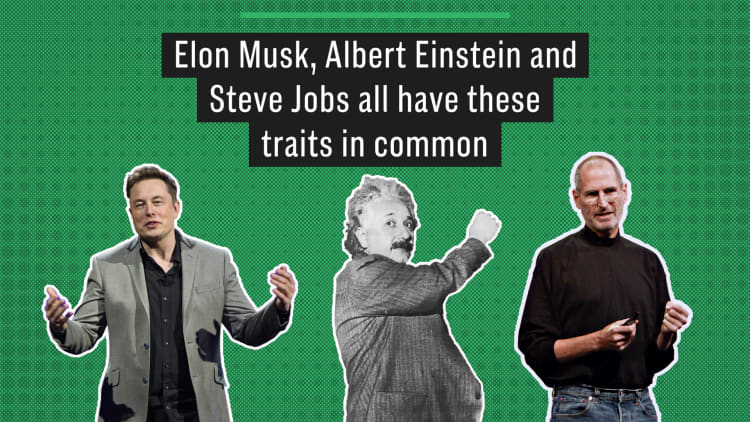What do Albert Einstein, Steve Jobs and Elon Musk have in common? Quite a lot, according to New York University professor Melissa Schilling's analysis in her new book "Quirky."
"These innovators worked in different fields and at different times, yet have some remarkable commonalities," Schilling tells CNBC Make It. "Though they have some traits that we cannot imitate — like Musk's photographic memory — there are other characteristics we can take advantage of, such as cultivating an ambitious goal, building our self-efficacy and spending time alone to exercise our independent thinking."
In "Quirky," Schilling analyzes the lives of Einstein, Musk and Jobs, among others, to determine how they each made history-altering discoveries.
"Studying these profoundly important people shows us that there are ways we can nurture the breakthrough innovation potential in us all," says Schilling, whose research focuses on innovation and strategy in high tech industries.
As some of the world's greatest inventors, here are the three traits Einstein, Jobs and Musk have in common, according to Schilling's analysis.
They were self-sufficient
Jobs, Einstein and Musk all displayed a strong "sense of separateness" or a feeling of social detachment or of not belonging growing up, says Schilling.
"At first, I thought this was maybe just a side effect of something else related to innovation," she says. "Particularly Einstein and Musk, they were so introspective as children that people thought they were deaf."
As a child, Musk was the smallest in his class, a "super nerd," who was often bullied.

Schilling points out that because his family moved so often — Musk went to seven different schools growing up — it was difficult for him to build strong social connections.
"Musk responded to this sense of separation by escaping into books and computer programming, ultimately writing and selling his first video game at the age of 12," Schilling says.
As for Jobs, Schilling says his strong-willed and somewhat abrasive personality made it difficult for him to sustain intimate friendships. Chrisann Brennan, Jobs' first girlfriend and mother of his first child said that even in high school, Steve was "disconnected and awkward," and that he had "a mix of genius, authenticity and emotional woodenness."
Einstein articulated at length how not belonging made him much less likely to bow to conventional wisdom and obey the norms of the academic fields, Schilling notes, even though he knew that would cause a lot of ire.
"It's a big part of why he was able to cast away Newtonian concepts that held back other scientists and enabled him to come up with scientific theories that were really revolutionary for his time," Schilling says.
As Schilling points out, Einstein once noted: "My passionate sense of social justice and social responsibility has always contrasted oddly with my pronounced freedom from the need for direct contact with other human beings and human communities. I gang my own gait and have never belonged to my country, my home, my friends, or even my immediate family, with my whole heart."
Ultimately, Schilling says their self-sufficiency made them independent thinkers who could challenge the status quo.
"Because they didn't belong to the social world, they didn't have to obey its rules, freeing them to develop bold ideas and stick with them even in the face of criticism," she says. "This highlights the value of spending some time alone, reading, writing and thinking about things that we find intrinsically interesting."
They were idealistic
Jobs, Einstein and Musk exhibited idealism in their careers, Schilling says.
"Jobs wanted to revolutionize the way we think with computers. Einstein wanted to find a simple harmonious truth about how the universe works and Musk wants to save our species by weaning us off of fossil fuels and establishing a colony on Mars," she says.

When people are genuinely motivated to do something, they will work harder and longer and will stick with their goals in the face of criticism, Schilling explains. Neither Jobs, Einstein or Musk came from wealthy families, which forced them to have this self-made mindset.
They also relied heavily on needing access to other smart people in order to execute their ideas. In their case, having access to expertise or intellectual resources was more important to them than having access to financial resources.
"Pursuing goals they see as intrinsically noble and important made them fiercely motivated and focused and it provided a form of ego defense against criticism and failure," Schilling says. "We can all benefit by cultivating a grand ambition, a goal that is big enough to stretch our vision beyond our current horizon and important enough that it fuels our tenacious effort."
They weren't all-star students
"Each of these men chafed at the structure of formal education," Schilling says.
Though Einstein was profoundly gifted at mathematics and physics, his disrespect for authority created friction with his teachers. He often missed class or arrived late and even when in class his teachers perceived him as rebellious. Those teachers later made it difficult for Einstein to attain an academic post.

Schilling notes that Jobs was also gifted. In the fourth grade, he tested at the tenth-grade level. Though he dropped out of Reed College, he stayed on campus to attend classes of his own choosing. He later remarked that it was the best decision of his life because it allowed him to study those things he found intrinsically interesting.
Meanwhile, Musk has a photographic memory and got exceptional grades in classes that interested him. When it came to classes he wasn't interested in, he ran into trouble applying himself. Musk has noted that in college he rarely attended classes and instead just showed up to take the exams.
Musk started studying physics at Queen's University in Canada, transferred after two years to the University of Pennsylvania and got a second bachelor's degree in economics at the Wharton School. He attended Stanford to pursue a Ph.D. in applied physics, but dropped out to start a company with his brother.
Though each of these men found the structure of formal education constraining, Schilling says. we should not conclude that education was unimportant to them.
"One of the implications for the rest of us – whether we invest in formal education or not – is that we should look for those topics we find interesting and important and study them intensely on our own terms," Schilling says. "The topics we study on our own are the areas in which we are more likely to develop creative ideas."
Like this story? Like CNBC Make It on Facebook.
Don't miss:



